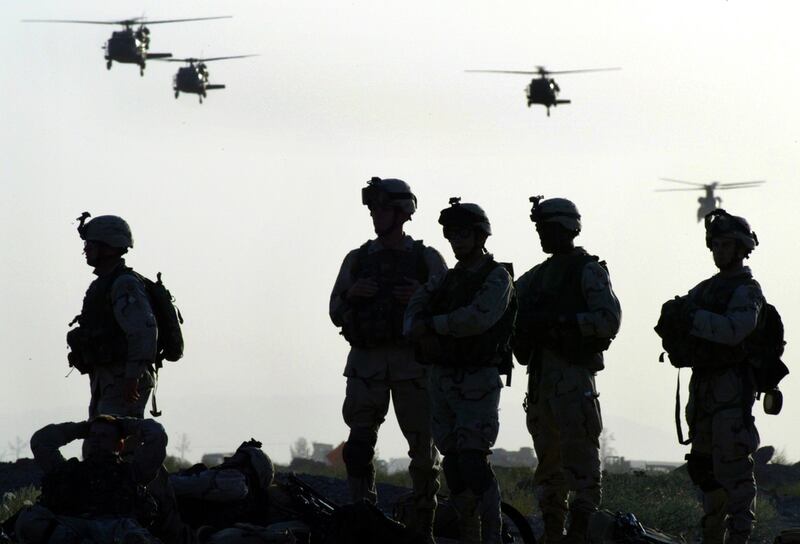Some of the myths that drive Arab discourse about American behaviour in the Middle East are fascinating for what they say about America’s relationship with the region. Though often wrong, they persist.
What many Arabs understand is that important parts of their world appear to be spinning out of control and that Israel and Iran are ascendant. What they do not understand is why America’s role is either absent or less than decisive. And because many Arabs stubbornly hold on to myths about America’s power, they conclude that the unravelling must be by design.
With people in the Arab world accepting America’s projection of this “larger than life” image, they ask if America could do all this, why did they allow Iran to gain the upper-hand in Iraq? Why have they allowed the bloodletting to go on in Syria for so long? Why did they make possible the removal of the Libyan dictator and then walk away leaving a civil war? And they ask why does the US continue to allow Israel to run roughshod over Palestinians?
All of this adds up to a confounding state of affairs. In an effort to make sense of this confusion many Arabs have made a leap of faith. In effect, they have concluded that if the region is unravelling and America isn’t acting decisively, then it must be that US policymakers are either behind this state of affairs or are pleased with it.
I have heard commentators argue that the US war against Iraq accomplished its strategic objective. According to this view, the war was not designed to create a progressive post-Saddam democracy but to unleash Iran on the region thereby causing the Arab world to seek greater protection from the US. This may be what has happened. But I do not believe that anyone in the Bush administration was clever enough to have executed such a scenario. And yet, such fantastic explanations are believed by some.
In response, I try to disabuse my friends of the myths and ask them to recognise the sad truth that the US is not always smart. Recall that the Bush war planners argued that the invasion of Iraq would be a “cake-walk” that would be won within weeks and that US troops would only need to be there for six months, at a cost of no more than $2 billion. They believed the US military would be welcomed as liberators, that a democracy would be born that would “be a beacon lighting the way for the region” and that America’s global leadership would be assured.
Instead, the exact opposite occurred, resulting in incalculable damage not only to Iraq and the region, but to America. The war showed the limits of US power. Its total cost will run into the trillions of dollars. It exhausted our military and destroyed thousands of lives. In the end, the war left the region in turmoil and America less respected in the world.
This was the world Barack Obama inherited when he became president. He also inherited a Washington that was deeply divided. Mr Obama promised fundamental change. But the promises he made and the expectations he raised may have fuelled the myths of America’s capacity to move mountains.
For example, the president committed to closing Guantanamo, ending the wars in Iraq and Afghanistan, resolving the Israeli-Palestinian conflict and engaging constructively with the Muslim world. However, he soon confronted the realities of Washington dysfunction.
From the beginning of his term in office, hyper-partisanship in Congress has limited the capacity of the president to act constructively in the Middle East. And while hawkish senators make flippant remarks about sending US troops to particular countries, they forget to ask the military if their depleted forces can take on another assignment.
So the explanation as to why the White House hasn’t been eager to commit US troops or to supply advanced weapons indiscriminately to groups fighting in Syria or elsewhere, is not that they have a conspiracy brewing with Iran or that they simply want conflicts to continue. Rather it is because this president, reading the mood of the American people and the military, has wanted to end old wars, while being reluctant to get dragged into any new ones.
Given all this, it may still be fair for Arabs to criticise the president’s judgement or to decry his failure to provide leadership to a Middle East in the throes of traumatic change. But what is neither fair nor smart is to stubbornly cling to myths, which only avoid dealing with realities.
In this context, it is important that some Arab leaders are recognising that they must become the agents of change in their own region and take the lead in building a military force to take on ISIL.
They recognise that they must invest in rebuilding the region’s economies and that they must use their political leverage to resolve conflicts.
This movement away from dependency toward self-reliance is significant. As Arab leaders take such initiatives, they have the right to insist that America supports their efforts, as an ally, not as a saviour. This development presents us all with the possibility of a new US-Arab relationship based partnership, not on myth.
James Zogby is the president of the Arab American Institute
On Twitter: @aaiusa





